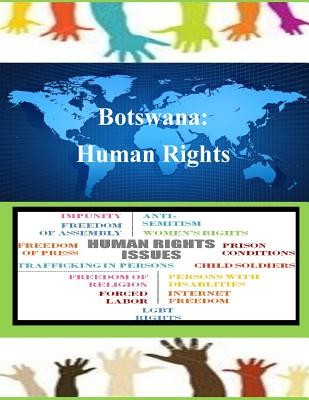
- We will send in 10–14 business days.
- Author: United States Department Of Defense
- Publisher: CreateSpace Independent Publishing Platform
- Year: 2014
- Pages: 30
- ISBN-10: 1502826577
- ISBN-13: 9781502826572
- Format: 21.6 x 27.9 x 0.2 cm, minkšti viršeliai
- Language: English
- SAVE -10% with code: EXTRA
Reviews
Description
Botswana has been a constitutional multi-party republican democracy since independence in 1966. Its constitution provides for the indirect election of a president and the popular election of a national assembly. In 2009 the ruling Botswana Democratic Party (BDP) won the majority of parliamentary seats in an election deemed generally free and fair. President Ian Khama, who has held the presidency since the resignation of former president Festus Mogae in 2008, retained his position. The BDP has held the presidency and a majority of National Assembly seats since independence. Security forces reported to civilian authorities. Authorities maintained effective control over the security forces. Security forces sometimes committed human rights abuses. Violence, including sexual violence, against women and children; child labor in cattle herding, agriculture, and other work; and discrimination against the Basarwa people persisted as principal human rights concerns. Other significant human rights problems included occasional excessive use of force and abuse by security personnel, police corruption, government attempts to limit press freedom, and shortcomings in the judicial process including lengthy delays and failure to inform defendants of their pretrial rights. Societal problems included trafficking in persons and discrimination against women and children; persons with disabilities; persons with HIV/AIDS; and gay, lesbian, bisexual, and transgender (LGBT) persons. The government took steps to prosecute officials who committed abuses, including prosecuting and convicting military officers for murder. Impunity was generally not a problem.
- Author: United States Department Of Defense
- Publisher: CreateSpace Independent Publishing Platform
- Year: 2014
- Pages: 30
- ISBN-10: 1502826577
- ISBN-13: 9781502826572
- Format: 21.6 x 27.9 x 0.2 cm, minkšti viršeliai
- Language: English English
Botswana has been a constitutional multi-party republican democracy since independence in 1966. Its constitution provides for the indirect election of a president and the popular election of a national assembly. In 2009 the ruling Botswana Democratic Party (BDP) won the majority of parliamentary seats in an election deemed generally free and fair. President Ian Khama, who has held the presidency since the resignation of former president Festus Mogae in 2008, retained his position. The BDP has held the presidency and a majority of National Assembly seats since independence. Security forces reported to civilian authorities. Authorities maintained effective control over the security forces. Security forces sometimes committed human rights abuses. Violence, including sexual violence, against women and children; child labor in cattle herding, agriculture, and other work; and discrimination against the Basarwa people persisted as principal human rights concerns. Other significant human rights problems included occasional excessive use of force and abuse by security personnel, police corruption, government attempts to limit press freedom, and shortcomings in the judicial process including lengthy delays and failure to inform defendants of their pretrial rights. Societal problems included trafficking in persons and discrimination against women and children; persons with disabilities; persons with HIV/AIDS; and gay, lesbian, bisexual, and transgender (LGBT) persons. The government took steps to prosecute officials who committed abuses, including prosecuting and convicting military officers for murder. Impunity was generally not a problem.


Reviews